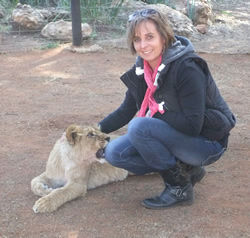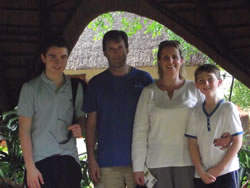- Home » Expat Articles » Interviews » Expat Interview With Suzanne - England to South Africa
Expat Interview With Suzanne - England to South Africa
| Published: | 15 Dec at 9 AM |
Want to get involved?
Become a Featured Expat and take our interview.
Become a Local Expert and contribute articles.
Get in touch today!
Become a Local Expert and contribute articles.
Get in touch today!
Filed: Interviews,South Africa
Suzanne, more commonly known as Chickenruby these days is married and lives in South Africa with her husband of 10 years and her two youngest children. She is however a mother of three and a mother to five. The other children are adults and remained in the Uk having already left home. Having spent a year settling her family into their new life, Suzanne has set about putting her skills and knowledge of teaching special needs and working in Child Protection to use in volunteer work. Suzanne has discovered new skills and makes cup cakes which she delivers into townships and sews handbags that she sells to raise money for charity (KWO.org.za). Suzanne's blog is called Chickenruby (see listing here)

Where are you originally from?
I was born in Wales and grew up around England.
In which country and city are you living now?
I live in Centurion in South Africa.
How long have you lived here and how long are you planning to stay?
I moved here on January 19th 2011, visas have been renewed until Jan 2016 and then an application for residency can be made.
Why did you move and what do you do?
My husband’s job brought us here, he's been with a global company for 27 years and they wanted to develop n South Africa.
I am unable to work due to government rules, but I am a qualified Special Needs teacher specialising in Autism and I also worked as a Child Protection Officer in the UK for the Football Association prior to our move.
I work as a volunteer at a residential home for Adults with disabilities in the work shop and I'm also involved with their children’s home and Early Learning Centres. I also fundraise.
 Did you bring family with you?
Did you bring family with you?
We brought the youngest two children with us, then aged 11 and 15, both boys. We left three in the UK, son then aged 18 in Reading training in hotel management, daughter then aged 22 in full time residential care in Gloucester and son aged 21 in the army in Germany.
How did you find the transition to living in a foreign country?
I used to work supporting young adults and their families with the transition from child services into adult services. I knew my stuff. I had years of experience, knowledge and support from other professionals.
Lets just say I thought moving our daughter into adult residential care was traumatic, it was nothing compared to moving to a foreign country where you know no one and had zero support or assistance.
There hasn't been a transition, just a whole new way of life.
Was it easy making friends and meeting people; do you mainly socialise with other expats?
No, it took over a year for us to start making friends, Hubby had work colleagues and the kids had school, but for me with no access to employment and not hanging around the school gates as the children were older has been a difficult process.
I don’t think that we are expats, we are here for good, as long as the government renew our visas. The expats I've met have been fully supported by their company, are seasoned, kids in UK boarding schools, only here for 2 years and don't need to pay utility bills or purchase cars or open local bank accounts.
The best thing I did was make friends with other expats online to help understand the process and timescale of when things will start to feel better.
 What are the best things to do in the area; anything to recommend to future expats?
What are the best things to do in the area; anything to recommend to future expats?
Everything and anything. Local markets, safaris, shopping, countryside. Immerse yourself in life here from day one. Yes be aware of the crime and safety but don't be put off by the horror stories, start local with exploring and work your way outwards.
What do you enjoy most about living here?
I love the open space, the sun set and sun rise, the wildlife and tropical storms
How does the cost of living compare to home?
At first we found it very expensive compared to the UK, despite being paid in local currency. We had no credit history, were on a short visa and interest rates for loans to purchase a car, deposit on a house, purchasing beds etc ere much higher. Our container was 'lost' at customs meaning we lived on a tight budget for the first year and coupled with my loss of income it was difficult.
We also didn't know where to shop or venture too far a field for bargains. After recent visits to the UK and the loans now paid off we've noticed that the cost of living here is better than the UK. The only big difference is there is no supermarket competition so prices are standard across the region.
 What negatives, if any, are there to living here?
What negatives, if any, are there to living here?
The distance from the UK in an emergency. There have been 2 family deaths, my father had a heart attack and my nephew critically injured when a wall collapsed on him. All 3 of the children have been hospitalised as have the two children here and myself.
Our biggest issue was how we weren't able to offer our support back home. Then realised actually that I did fly back for them all and no one has been out here for us because we cope. Which is true, if we 'needed' people then we wouldn't have moved here in the first place.
If you could pick one piece of advice to anyone moving here, what would it be?
Visit the country you intend to move to prior to actually arriving here. As spouse is meeting new colleagues, arrange for someone in the company to take you out to visit local areas, schools, malls etc to get a feel for the place, a chance to talk to a local to have more of an idea of what you need to pack in your container. Meet with HR in person not on phone, get things in writing and insist a relocation firm handles the move and have it written in the contract.
What has been the hardest aspect to your expat experience so far?
Not having any support.
 When you finally return home, how do you think you'll cope with repatriation?
When you finally return home, how do you think you'll cope with repatriation?
This is home now.
What are your top 5 expat tips for anyone following in your footsteps?
Tell us a bit about your own expat blog.
I blog about being a parent and an expat and use it to tweet longer when a subject gets on my nerves. I blog about the positives and negatives, the funny things and I tell the truth.
How can you be contacted for further advice to future expats coming to your area?
Either on my blog or @chickenruby on twitter. I'm also found on mumsnet, netmums, loveallblogs, blogexpat, britmums and I'm happy to email once I get to know someone a little better.
Suzanne blogs at http://www.chickenruby.com/ which we recommend a quick visit if you haven't been already. Chickenruby has an ExpatsBlog.com listing here so add a review if you like! If you appreciated this interview with Suzanne, please also drop her a quick comment below.

Here's the interview with Suzanne...
Where are you originally from?
I was born in Wales and grew up around England.
In which country and city are you living now?
I live in Centurion in South Africa.
How long have you lived here and how long are you planning to stay?
I moved here on January 19th 2011, visas have been renewed until Jan 2016 and then an application for residency can be made.
Why did you move and what do you do?
My husband’s job brought us here, he's been with a global company for 27 years and they wanted to develop n South Africa.
I am unable to work due to government rules, but I am a qualified Special Needs teacher specialising in Autism and I also worked as a Child Protection Officer in the UK for the Football Association prior to our move.
I work as a volunteer at a residential home for Adults with disabilities in the work shop and I'm also involved with their children’s home and Early Learning Centres. I also fundraise.
 Did you bring family with you?
Did you bring family with you?We brought the youngest two children with us, then aged 11 and 15, both boys. We left three in the UK, son then aged 18 in Reading training in hotel management, daughter then aged 22 in full time residential care in Gloucester and son aged 21 in the army in Germany.
How did you find the transition to living in a foreign country?
I used to work supporting young adults and their families with the transition from child services into adult services. I knew my stuff. I had years of experience, knowledge and support from other professionals.
Lets just say I thought moving our daughter into adult residential care was traumatic, it was nothing compared to moving to a foreign country where you know no one and had zero support or assistance.
There hasn't been a transition, just a whole new way of life.
Was it easy making friends and meeting people; do you mainly socialise with other expats?
No, it took over a year for us to start making friends, Hubby had work colleagues and the kids had school, but for me with no access to employment and not hanging around the school gates as the children were older has been a difficult process.
I don’t think that we are expats, we are here for good, as long as the government renew our visas. The expats I've met have been fully supported by their company, are seasoned, kids in UK boarding schools, only here for 2 years and don't need to pay utility bills or purchase cars or open local bank accounts.
The best thing I did was make friends with other expats online to help understand the process and timescale of when things will start to feel better.
 What are the best things to do in the area; anything to recommend to future expats?
What are the best things to do in the area; anything to recommend to future expats?Everything and anything. Local markets, safaris, shopping, countryside. Immerse yourself in life here from day one. Yes be aware of the crime and safety but don't be put off by the horror stories, start local with exploring and work your way outwards.
What do you enjoy most about living here?
I love the open space, the sun set and sun rise, the wildlife and tropical storms
How does the cost of living compare to home?
At first we found it very expensive compared to the UK, despite being paid in local currency. We had no credit history, were on a short visa and interest rates for loans to purchase a car, deposit on a house, purchasing beds etc ere much higher. Our container was 'lost' at customs meaning we lived on a tight budget for the first year and coupled with my loss of income it was difficult.
We also didn't know where to shop or venture too far a field for bargains. After recent visits to the UK and the loans now paid off we've noticed that the cost of living here is better than the UK. The only big difference is there is no supermarket competition so prices are standard across the region.
 What negatives, if any, are there to living here?
What negatives, if any, are there to living here?The distance from the UK in an emergency. There have been 2 family deaths, my father had a heart attack and my nephew critically injured when a wall collapsed on him. All 3 of the children have been hospitalised as have the two children here and myself.
Our biggest issue was how we weren't able to offer our support back home. Then realised actually that I did fly back for them all and no one has been out here for us because we cope. Which is true, if we 'needed' people then we wouldn't have moved here in the first place.
If you could pick one piece of advice to anyone moving here, what would it be?
Visit the country you intend to move to prior to actually arriving here. As spouse is meeting new colleagues, arrange for someone in the company to take you out to visit local areas, schools, malls etc to get a feel for the place, a chance to talk to a local to have more of an idea of what you need to pack in your container. Meet with HR in person not on phone, get things in writing and insist a relocation firm handles the move and have it written in the contract.
What has been the hardest aspect to your expat experience so far?
Not having any support.
 When you finally return home, how do you think you'll cope with repatriation?
When you finally return home, how do you think you'll cope with repatriation?This is home now.
What are your top 5 expat tips for anyone following in your footsteps?
- Visit (see above)
- Sort out all UK finances prior to moving inc tenants for house or sale, sll utility bills, change of address (family member) sell car etc and get goods shipped.
- Use a relocation expert through the company and get them to organise and arrange everything in regards to quotes and furniture removal.
- Hand your notice in spouse ASAP and start with the move, sorting, donating and selling unwanted/unneeded items. Sort storage space in home country.
- Say goodbye to friends as if you'll never see them again as that's probably what will happen and you'll only end up stressing yourself out about trying to maintain contact.
Tell us a bit about your own expat blog.
I blog about being a parent and an expat and use it to tweet longer when a subject gets on my nerves. I blog about the positives and negatives, the funny things and I tell the truth.
How can you be contacted for further advice to future expats coming to your area?
Either on my blog or @chickenruby on twitter. I'm also found on mumsnet, netmums, loveallblogs, blogexpat, britmums and I'm happy to email once I get to know someone a little better.
Suzanne blogs at http://www.chickenruby.com/ which we recommend a quick visit if you haven't been already. Chickenruby has an ExpatsBlog.com listing here so add a review if you like! If you appreciated this interview with Suzanne, please also drop her a quick comment below.
Grab a featured expat badge that links to this interview!
 Copy and paste code to display the Featured Expat Badge:
Copy and paste code to display the Featured Expat Badge:Comments » No published comments just yet for this article...
Feel free to have your say on this item. Go on... be the first!





